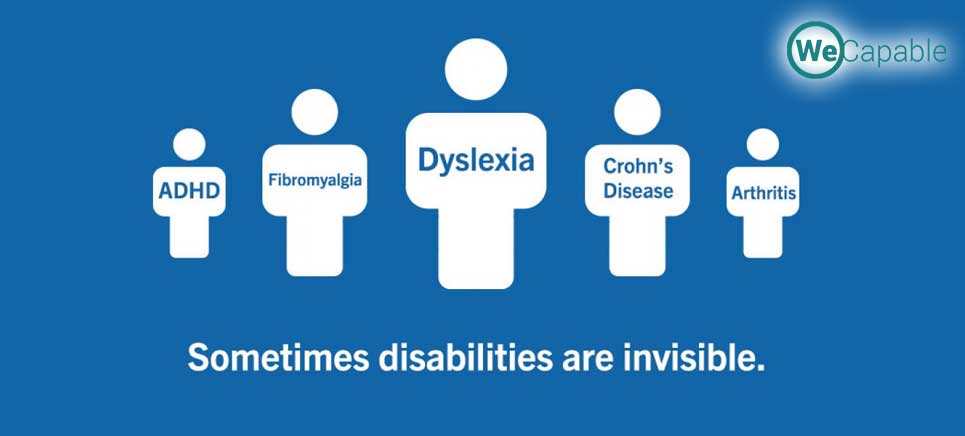Invisible disability, another name for hidden disability, is a disability that is not apparent or visible. It is an umbrella term that covers a wide variety of hidden disabilities and challenges. As invisible disabilities are not immediately apparent to others, people with an invisible disability are often misunderstood or are accused of faking their problems. Through this article, we intend to make you aware and considerate about people’s problems that might not be visible to your eyes.
Invisible Disability: A Brief Introduction
Various disabilities that are not visible to others are primarily neurological in nature. Some people with visual or auditory disabilities may not seem disabled if they do not wear glasses or a hearing aid. Sitting disability i.e. challenges in sitting due to chronic back pain etc. is also a relatively common kind of invisible disability. The invisible disabilities create challenges for the person in their day-to-day life while others won’t be able to see or acknowledge the disability. The various kinds of invisible disabilities may be caused due to chronic illness, chronic pain, accidental injury or even birth disorders.
A point worth noting here is that not all persons with one or the other chronic medical condition are considered to have an invisible disability. A person with any medical condition would be considered to be a disabled person only if the condition substantially limits one or more major life activities. If a condition does not significantly impair normal activities of daily living, then it would not be called an invisible disability.
List of Some Common Invisible Disabilities
The number of invisible disabilities is so long that we cannot provide an exhaustive list. So, here we are giving a small list of examples of invisible disabilities.
1. Chronic Pains
These pains may be caused by a variety of reasons including bone disease, physical injuries, back problems etc. The pain may restrict many daily life activities of the person but the disability is not seen by others who do not understand the medical condition.

2. Chronic Dizziness
It is often associated with problems of the inner ear. Onlookers will see no disability while it may cause impairment for the person when walking, driving, sleeping, and doing other day-to-day tasks.
3. Chronic Fatigue
Individual with this condition feels constantly tired for no reason. As there is no visible evidence for others, people with this condition are often misunderstood to be lazy.
4. Psychiatric Disabilities
Conditions like depression, attention deficit disorder, agoraphobia, schizophrenia etc. may be debilitating for the victim and may make everyday tasks difficult if not impossible. But, again the disability will remain invisible to others.
5. Fibromyalgia
Fibromyalgia is considered to be one of the most common reasons for invisible disability. People with the condition complain about constant pain all over the body coupled with tiredness. Doctors often fail to find out the reason behind tiredness and pain even after multiple clinical tests.
6. Diabetes
It is known commonly as the disease where the body fails to regulate sugar level in the blood. What is not known commonly is that diabetes too can impair a person’s day to day activities. Diabetes can indeed be a debilitating condition.
7. Irritable Bowel Movement Syndrome
This condition can make life miserable for the person with the condition. But, they are often labelled as hypochondriacs and are bombarded with healthy lifestyle suggestions.
What Everybody should Understand about Invisible Disability
- Invisible disability is not a rare thing. We fail to acknowledge but there are a large number of individuals around us who are silently struggling with their invisible disabilities.
- If someone ‘seems’ to be perfectly normal, they should not be judged as lazy or ridiculed as fake if they say they cannot do a certain thing. We need to develop our listening and accepting capacity to understand other’s problems. Don’t judge someone for using a lift if they are not on a wheelchair or crutches or any other walking aids.
The bottom line is that everybody is fighting their own battle, let’s not judge anybody as capable or not-capable based on what we see with our eyes. Be compassionate and hear what others have to say. Don’t put down anybody by saying “But, you look completely fine”.
Use the citation below to add this article to your bibliography
"Understanding Invisible Disabilities: Meaning and Examples." Wecapable.com. Web. October 22, 2024. <https://wecapable.com/invisible-disability-meaning-examples/>
Wecapable.com, "Understanding Invisible Disabilities: Meaning and Examples." Accessed October 22, 2024. https://wecapable.com/invisible-disability-meaning-examples/
"Understanding Invisible Disabilities: Meaning and Examples." (n.d.). Wecapable.com. Retrieved October 22, 2024 from https://wecapable.com/invisible-disability-meaning-examples/

Hello. I have Type 1 diabetes, Hashimoto’s, underactive thyroid, gastroparesis and gastritis. These conditions have unpredictable symptoms, work against one another, cause lots of fatigue, cause skin rashes, cause GI issues, cause malnutrition and cause allergies (i.e., indoor, outdoor, chemical and food). To prevent fatigue and/or brain fog, I must eat small meals every three (3) hours. Sometimes eating helps, sometimes not. On a daily basis, I must compose new food journals/grocery lists. Preparing meals for work and home are burdensome. At times, my body rejects food. Cooking is becoming intolerable. Preparing for/commuting to work is exhausting. At work I am productive, but not as productive as I would like to be. I do not know how to handle all of this. I can barely make it to work and home. Stopping at the pharmacy once a month adds to my fatigue. My quality of life is poor and finances are even more poor. I need help. Please. Thank you.